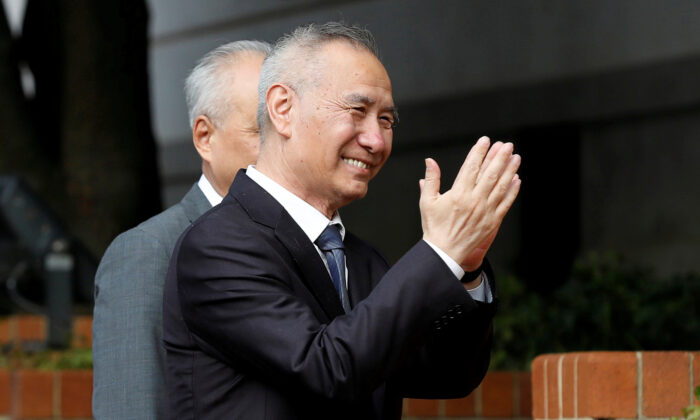House Democrats Say ‘No Set Timeline’ for Vote on War Powers Resolution on Iran
BEIJING—China’s Vice Premier Liu He, head of the country’s negotiation team in Sino-U.S. trade talks, will sign a “Phase 1” deal in Washington next week, the commerce ministry said on Jan. 9.
Liu will visit Washington on Jan. 13-15, said Gao Feng, spokesman at the commerce ministry.
Negotiating teams from both sides remain in close communication on the particular arrangements of the signing, Gao told reporters at a regular briefing.
U.S. President Donald Trump said on Dec. 31 that the Phase 1 deal with China would be signed on Jan. 15 at the White House. Trump also said he would sign the deal with “high-level representatives of China” and that he would later travel to Beijing to begin talks on the next phase.
The Chinese delegation will include 10 officials, among them Zhong Shan, minister of commerce, Yi Gang, governor of the People’s Bank of China, Liao Min, vice minister of finance and Zheng Zeguang, vice minister of foreign affairs, as well as China‘s ambassador to Washington, Cui Tiankai, according to a U.S. source familiar with the preparations.
The Phase 1 deal reached last month is expected to cut tariffs and boost Chinese purchases of U.S. farm, energy and manufactured goods while addressing some disputes over intellectual property.
Washington, Europe, Japan and other trading partners complain Beijing steals or pressures foreign companies to hand over technology. Washington is pressing China to roll back plans for state-led creation of global competitors in robotics and other industries that its trading partners say violate its market-opening commitments.
The Trump administration says some tariffs must remain in place to ensure Beijing carries out any promises it makes.
But no version of the text has been made public, and Chinese officials have yet to publicly commit to key points such as increasing imports of U.S. goods and services by $200 billion over two years.
China will not increase its annual low-tariff import quotas for corn, wheat and rice to accommodate stepped-up purchases of farm goods from the United States, senior agriculture official Han Jun said on Tuesday, according to local media group Caixin.
The move could make it harder for Beijing to meet import commitments in a Phase 1 trade deal. Trump said last month the agreement would likely double China‘s $24 billion in pre-trade war purchases to $40 billion-$50 billion annually.
When asked if China would have to reduce grain imports from other countries in order to meet its U.S. commitments, Gao said that China will continue to improve the administration of tariff quotas for wheat, corn and soybeans in accordance with World Trade Organization commitments, and will make full use of quotas according to market conditions.
This is not inconsistent with expanding agricultural imports from the United States, said Gao.
The United States launched a trade war against Beijing a year and half ago over allegations of unfair trade practices, such as theft of U.S. intellectual property and subsidies that unfairly benefit Chinese state-owned companies.
The Associated Press contributed to this report
This article is from the Internet:China’s Vice Premier Liu to Sign US Trade Deal in Washington Next Week
